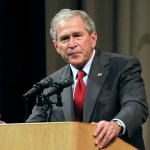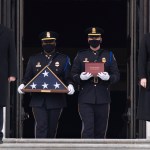Prime

From TPM Reader BS …
I had hoped that this time might be different. That on the rebound from Trump, we might see some truly transformational legislation. That the filibuster would be scrapped, D.C. would be granted statehood, the right to vote would be protected and expanded, and the courts would significantly unwound from their recent rightward corkscrew. Mainly, though, I had what I knew to be an irrational hope that there would be action on climate sufficient to fit the moment.

From TPM Reader JB …
I always wanted to believe Trump was a last desperate charge of Old White Men in a losing a 50 year (or 150 year) war to retain their monopoly on power. Demographics are against them. Young people lean against them. Women lean against them. Black and Brown people lean against them. Cities against. Coasts against. The educated against. They know it. They fear it. They hate it. Voting for Trump was supposed to be a giant fuck you on their way out — half curse, half joke. But he won, it went to their heads, and they tried to end the game before losing it.

From TPM Reader EF …
I have been very heartened by Biden. The legislative success of the stimulus, the competence shown with the vaccine rollout, and the upcoming stimulus bill point to the possibility of people rediscovering that government can make a difference in their lives.
 Where Things Stand: White Gun Couple Clings To Relevance
Where Things Stand: White Gun Couple Clings To Relevance 
Derek Chauvin was found guilty on all counts in the murder of George Floyd last night, the first verdict of its kind in a landmark case that inspired a wave of protests across the nation last summer against police brutality and systemic racism.
A few hours later, the St. Louis lawyer Mark McCloskey — who become known for standing barefoot outside his home alongside his wife last summer as the two pointed weapons at peaceful Black Lives Matter protesters — told Politico that he was considering a Senate bid in Missouri.
“I can confirm that it’s a consideration, yes,” McCloskey reportedly said Tuesday evening.

There are a host of articles today about the US reaching a vaccination tipping point at which the key challenge is no longer the supply of vaccine but the supply of people willing to take it. Like “herd immunity” it isn’t a binary, clear-cut moment. It’s incremental. We’re approaching it now and the challenge will accelerate over the next two to four weeks. In many ways this challenge is a product of our success. In January I don’t think anyone thought we’d have widespread availability and half of all adults vaccinated in April. But we did it.

I’m working my way through your emails on making sense of the post-Trump Era. Please keep them coming. (See the linked post for more details.) They are fascinating but like the topic itself they are hard to bring into focus. There are common themes but they are elusive. I will be publishing a number of them. But I wanted to start with this note from TPM Reader CC, who lives in Australia. It’s a very different perspective given that’s from someone in a foreign country on the other side of the world. But I found it very interesting as a window into what America now looks like from abroad …
 Where Things Stand: Bush Describes Modern-Day GOP As ‘Nativist’
Where Things Stand: Bush Describes Modern-Day GOP As ‘Nativist’ 
“It’s not exactly my vision,” former President George W. Bush said of his Party during a live interview with NBC’s “Today” show this morning.

A very interesting backgrounder from TPM Reader AH on the specifics of the kind of stroke that killed Brian Sicknick …
Hi, Josh! This is a topic I really do know something about – I am consulted to see several patients for stroke every day. The news about Brian Sicknick having died from a brainstem stroke is a bit of a surprise to me, because they are uncommon in general, and for a young, healthy guy to have one raises my eyebrows. To die from one is less surprising – these are the most, or maybe tied for the most lethal strokes you could possibly have.
 What To Make of the Death of Brian Sicknick?
What To Make of the Death of Brian Sicknick? 
What are we to make of yesterday’s news that Capitol Police Officer Brian Sicknick died of ‘natural causes’? Sicknick’s death and to a much lesser degree the suicides of two other Capitol Police Officers within days of the insurrection are inextricably bound up in the story of that day and the gravity of those events. The Medical Examiner’s comments to the Post were themselves contradictory, at least in layman’s terms. Francisco J. Diaz found no discrete injury such as a head wound that would have been a proximate cause of Sicknick’s strokes. He also found no sign of acute respiratory constriction, which would be the standard sign of an allergic reaction to chemical spray which also could have caused a subsequent stroke. Yet Diaz also said of the events of January 6th and Sicknick’s confrontation with insurrectionists that “all that transpired played a role in his condition.”
What does that mean?
